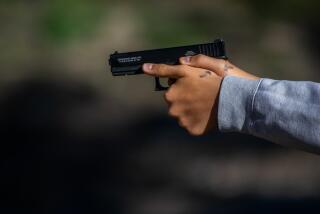A rogue ex-cop who shouldn’t be armed
- Share via
SACRAMENTO — Here’s an idea for a new gun control law: How about immediately seizing the personal arsenal of a fired cop?
Dishonorably discharged soldiers, after all, aren’t allowed to own firearms. Why should dishonored cops?
Like booted officer Christopher Jordan Dorner, who allegedly went on a vengeful killing rampage four years after being fired from the Los Angeles Police Department.
Maybe, at least, Dorner should have been required to undergo psychological testing upon being sacked to determine whether he was mentally fit to own weapons.
True, there may be a constitutional problem with that idea. He’s still a citizen, presumably with a 2nd Amendment right to keep and bear arms. That doubtless would be the argument of gun-rights groups.
He wasn’t convicted of a crime. If we’re going to confiscate the weapons of an axed cop or subject him to psychological testing, shouldn’t we also take that precaution with, say, a fired fast-food burger-flipper?
Well, no, there’s a difference: We expect and demand more from police, who have been trained at public expense to be expert killers.
But never mind.
Dorner seemingly was law-abiding — until he wasn’t.
And that brings up a larger point: At minimum, he is another example of a so-called law-abiding, innocent gun owner who apparently went berserk and used his arsenal to kill people.
It makes such comments as this one recently uttered by National Rifle Assn. executive Wayne LaPierre look particularly inane and off target: “Law-abiding gun owners will not accept blame for the acts of violent or deranged criminals.”
News flash: Some law-abiders do become violent criminals. And their kill rate too often increases with their firepower.
Of course, this gets into the whole definition of “law-abiding.” Unfortunately, you don’t need to be exactly law-abiding to legally purchase a gun.
“It’s one of the really pervasive myths,” says Garen Wintemute, director of the UC Davis Violence Prevention Research Program. “If you ask people the question, ‘Can criminals legally buy guns?’ they laugh and say, ‘Of course not.’ But a large segment of the population has a criminal record and can still buy guns.”
Especially under federal law. Less so under California law.
Wintemute, an emergency room doctor who has been researching gun violence for three decades, refers to one category of firearms owner as “not so law-abiding.” These are people who have committed misdemeanors, but still are allowed to own guns.
“Under federal law, if I assault my intimate partner, I’m prohibited [from possessing a gun] for life,” he says. “But I can beat you up and nothing happens. I can have any number of convictions for violent misdemeanors — assault and battery, brandishing a firearm in a threatening way — and can buy as many guns as I want.
“California is different. California almost uniquely bans possession for anyone who has been convicted of a violent misdemeanor.”
A national study of prisoners convicted of a firearms-related felony found that 60% were not legally barred under federal law from owning a gun when they committed their crime, Wintemute says.
If California’s tighter gun-eligibility rules were applied, however, only around a third of the criminals would have been legal gun owners.
Just because the law allows these creeps to keep and bear arms, does that make them “law-abiding?” You might think so by listening to the gun lobby.
But crime records don’t seem to matter to the NRA. It’s fighting expanded background checks that might turn up red flags on gun buyers. Criminals would avoid background checking, LaPierre asserts, and law-abiders would be inconvenienced.
“The evidence is that these people [with criminal records] are a much greater risk for committing a future crime than the truly law-abiding gun owners,” Wintemute says.
“The question for us and the rest of the nation is, are we OK with that?”
Clearly we’re allowing too many people to buy and possess guns — characters who, by almost any logical criteria, should not be armed.
“I grew up around guns,” Wintemute says. “I was a member of the Rifle and Pistol Club at UC Davis. I’m not anti-gun. I’m anti-what guns can do....
“Nobody thinks that any one policy is going to take care of the entire problem. But, for most people, denying a gun purchase works.”
The two most important steps Wintemute would take, he says, would be to prohibit alcohol abusers from owning guns and to confiscate the roughly 39,000 weapons currently possessed by about 20,000 Californians legally barred from holding them.
“It’s a huge gap in our current regulation,” Wintemute says of the liquor laxity. “There is solid evidence — it’s not a matter of dispute — that alcohol abuse is a risk factor for committing violence.”
One bill proposed in the Legislature last week would prohibit gun ownership for anyone convicted twice of driving under the influence.
Another measure, coauthored by Senate leader Darrell Steinberg (D-Sacramento) and budget Chairman Mark Leno (D-San Francisco) would appropriate the $20-million-plus needed to seize the illegally held weapons.
There was a heavy volley of gun control proposals — some good, some goofy.
The good: Ban possession — not just the sale — of ammunition magazines holding more than 10 rounds. That probably would necessitate an expensive government buy-back.
Also introduced: A requirement that all new semiautomatic rifles come with fixed magazines. No detachables.
The goofy: Requiring all gun owners to buy liability insurance. A boon for insurers and a ludicrous burden for someone who hasn’t shot grandpa’s old shotgun in 40 years.
But really goofy: The idea that an angry, deeply disturbed fired cop was deemed fit to own guns.
More to Read
Sign up for Essential California
The most important California stories and recommendations in your inbox every morning.
You may occasionally receive promotional content from the Los Angeles Times.











